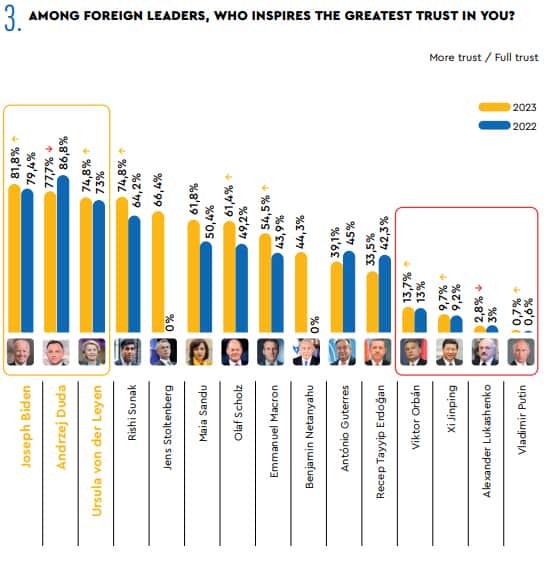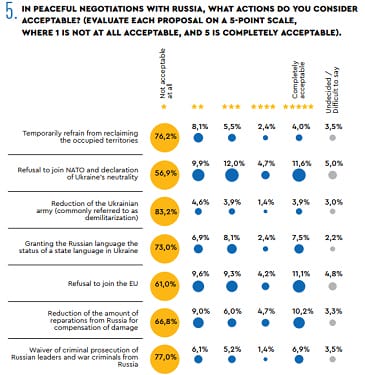Global leaders and countries gaining and losing Ukrainians' trust: change over a year
France and Germany have overcome their image problems in Ukraine, since their leaders are now trusted by Ukrainians. Trust in Moldova's leader has risen sharply, while the leaders of Poland and Turkiye are drifting in the opposite direction. Ukrainians have such a strong belief in NATO that the current Secretary General is one of the leaders they trust the most.
Abandoning the goal of joining the Alliance is an unacceptable scenario for the vast majority. There is even greater resistance to the potential loss of territory. In addition, the idea of joining NATO incrementally has significant support among the options if achieving a complete victory is currently impossible.
These are some of the findings of an opinion poll conducted by Info Sapiens on behalf of the New Europe Center (NEC) from 13 to 21 November 2023. There were already many sceptical signals from Western partners back then, so it is especially interesting how Ukrainians reacted to them. Ukrainian politics has been strongly linked to personalities for many years, and so it remains.
Parties are most often founded for a specific leader. Foreign policy for ordinary Ukrainians is also very much about personalities. They identify whole states with their de facto leaders, the president or prime minister.
There have been no changes in the presidents or governments of Ukraine's key partners over the past year, and this allows us to compare the changes with 2022. A similar survey was conducted by the NEC a year ago.
We have rounded the numbers to whole percentages.

So, which Western leaders do Ukrainians trust the most? The list was topped by US President Joe Biden, with 82% of respondents saying they "completely trust" him or have "some trust" in him. In second place is Polish President Andrzej Duda (77%). European Commission President Ursula von der Leyen and UK Prime Minister Rishi Sunak tied in third and fourth place (both 74%).
Following the top four leaders, there are four more Western politicians with high trust ratings: NATO Secretary-General Jens Stoltenberg (66%), President of Moldova Maia Sandu (62%), German Chancellor Olaf Scholz (61%), and French President Emmanuel Macron (55%).
The changes over the past year are more interesting. Only two leaders have maintained approximately the same level of trust as last year - Biden and von der Leyen. Both have increased their already high support.
All other leaders have either significantly lost or gained the trust of Ukrainians. Only one person has lost a lot - President of Poland Andrzej Duda. He was the leader in Ukrainians' trust abroad last year, with a significant lead over others.
He lost 9% and dropped to second place. Given recent Polish-Ukrainian disputes, this is still a moderate decline. The rest of the current leaders significantly increased their trust ratings.
For example, Maia Sandu (+12% over the year) gained the most trust among Ukrainians. This is not surprising considering Moldova's significant progress in its public attitude towards Putin and Russia. The country's top leadership now, in every speech about Ukraine, emphasises its gratitude to the Armed Forces and Ukrainians in general for saving Moldova from inevitable Russian occupation.
Trust in French and German leaders has radically increased (+12% each), making both of them now enjoy the support of an absolute majority of Ukrainians. The changes demonstrate that Ukrainians now strongly identify leaders with their respective countries. Macron has become the main "advocate for Ukraine" in Western Europe because he actively supports Ukraine's accession to NATO and the EU.
He personally negotiates with sceptics about starting accession negotiations for Ukraine, voted to invite Ukraine to the Alliance, supplied long-range SCALP missiles to Ukraine, and more. Nevertheless, he still lags behind Scholz. Macron, in his support for Ukraine, has surpassed his own country and many French politicians.
Olaf Scholz, on the other hand, now has a higher level of trust among Ukrainians than Macron (61% vs 55%), even though he rather slows down pro-Ukrainian decisions compared to other politicians and officials in Germany. Scholz personally opposes supplying Taurus missiles to the Ukrainian Armed Forces and, together with Biden, blocked Ukraine's invitation to NATO. However, overall German support lifts the trust in him.
Regardless of names, the fact that Ukrainians have started to massively trust Germany and France is a revolutionary change in the perception of Western partners. The survey results on Ukraine's enemies and unfriendly states are equally interesting. Putin and Lukashenko are, of course, anti-leaders with almost complete distrust among Ukrainians.
Following them, Chinese leader Xi Jinping ranks fifth with 85% of Ukrainians saying they predominantly or completely distrust him. The distrust in China in his person has increased by 12% over the year. In the "honourable" fourth place is Hungarian Prime Minister Viktor Orban with 78% distrust (+9 over the year).
The top five is closing Turkish President Recep Tayyip Erdogan with 61% distrust (+14!). Essentially, thanks to Erdogan's efforts, Turkiye has transformed from a neutral state into a "rather hostile" one in the perception of Ukrainians over the past year. The fact that the vast majority of Ukrainians in all controlled regions and abroad have become convinced the EU and NATO supporters is no longer a secret.
These ratings in surveys are breaking records. The path to joining both organisations may be protracted, as everyone has probably heard by now. So, are Ukrainians ready to sacrifice their future for NATO or the EU?
And what will they choose if full membership in the Alliance is not yet achievable?
67% of Ukrainians consider the possibility of refusing to join NATO or declaring Ukraine's neutrality in exchange for peace with Russia to be unacceptable or highly undesirable (57% vs 10%). Only 12% of respondents find this option completely acceptable. Regarding EU membership, 71% responded similarly (61% consider it absolutely unacceptable, 10% undesirable).
Only 11% fully agree with it. Other proposals, often heard from Russian propagandists, are completely rejected by Ukrainians. Any Ukrainian politician proposing such an exchange should understand that they will face resistance and misunderstanding from society.

Given that the swift liberation of the occupied territories does not look realistic, Ukrainians were also asked about the best interim option for security guarantees until the entire territory is liberated.
The "favourite" option among Ukrainians is the one advocated by several Western friends of Ukraine. The expert community often call it the "West German scenario," while opponents more commonly refer to it as "NATO accession in parts." It involves full NATO membership with security guarantees for the territory Ukraine currently controls, while the rest of Ukraine would be under the Alliance's umbrella in the future after de-occupation. This option was supported by 33% of respondents.
In second place with 21% is a defence alliance with the US "with commitments to protect Ukraine with the US army in case of an attack" (this option is a myth, as it is rejected in Washington). In third place with 19% is agreements for security assistance without involving foreign armies, only through the provision of weapons - essentially what is currently being negotiated with Western partners as temporary "security guarantees." What does the high support for "NATO accession in parts" mean?
The New Europe Center reasonably notes that these survey results indicate that citizens do not see an effective alternative to NATO membership and are willing to accept even partial membership. The study authors point out that "the dispersion of responses may indicate that Ukrainians are not very well informed about the details of the "security guarantees" discussion and that citizens do not see an effective alternative to the full membership of the country in NATO." Ukrainians also expressed support for security guarantees through the US army's intervention in the war, which is not being discussed. However, it should also be added that the "NATO accession in parts" option carries very real risks, and its promotion by Ukraine, in our opinion, is dangerous.
The survey results also indicate that Ukrainians idealise the state of relations with NATO, as seen in their expectations from the upcoming NATO summit. While Kyiv received a clear and sharp response from the White House about not discussing the possibility that Ukraine will receive a symbolic political invitation to NATO during the Alliance leaders' meeting in July 2024, Ukrainians expect to receive either almost full membership (19% of respondents mentioned this) or at least and the commencement of the accession process (25%).
Therefore, there are already exaggerated expectations, seven months before the highest-level meeting. The single-minded focus on NATO could be also positive.
Ukrainians already consider themselves part of the collective security system and are ready to contribute to assistance to partners even now during a large war. Almost half of the respondents (47%) answered "definitely" to the question "Should Ukraine provide assistance to the US and Taiwan in the event of a Chinese attack on Taiwan?" and only 4% said no, considering "China as our strategic partner." This unity may not remove all obstacles on Ukraine's path to the Alliance, but it certainly helps Ukraine demonstrate that it is part of a common security space.
You can read the full study in PDF in English. By Sergiy Sydorenko Editor, European Pravda
If you notice an error, select the required text and press Ctrl + Enter to report it to the editors.